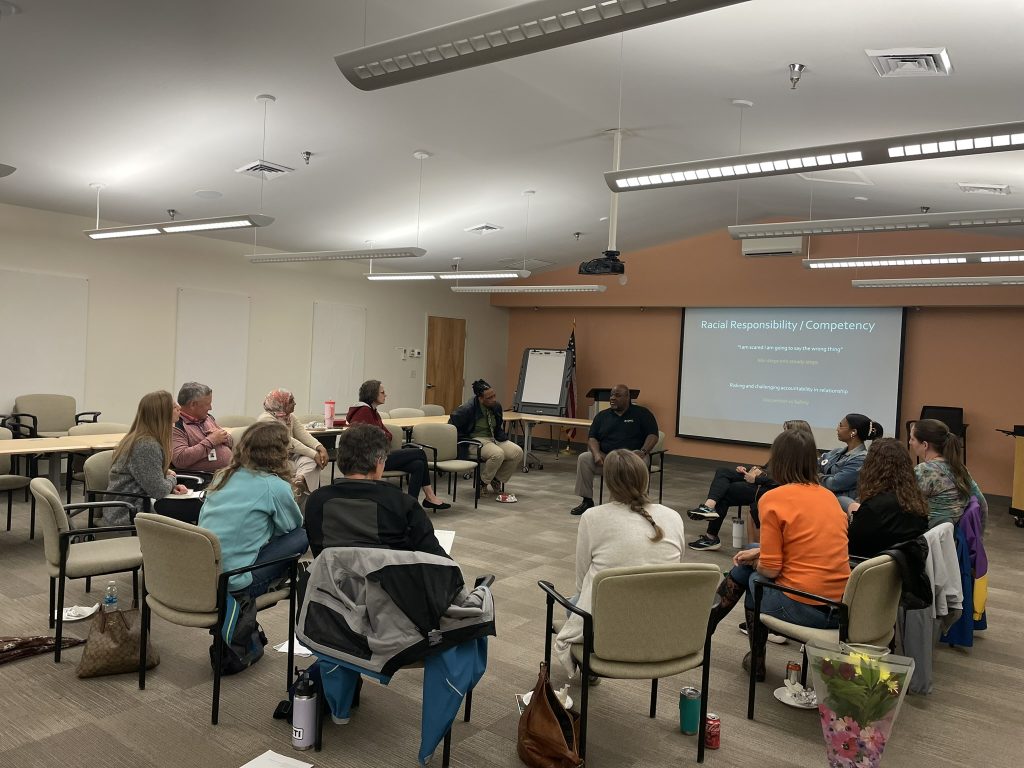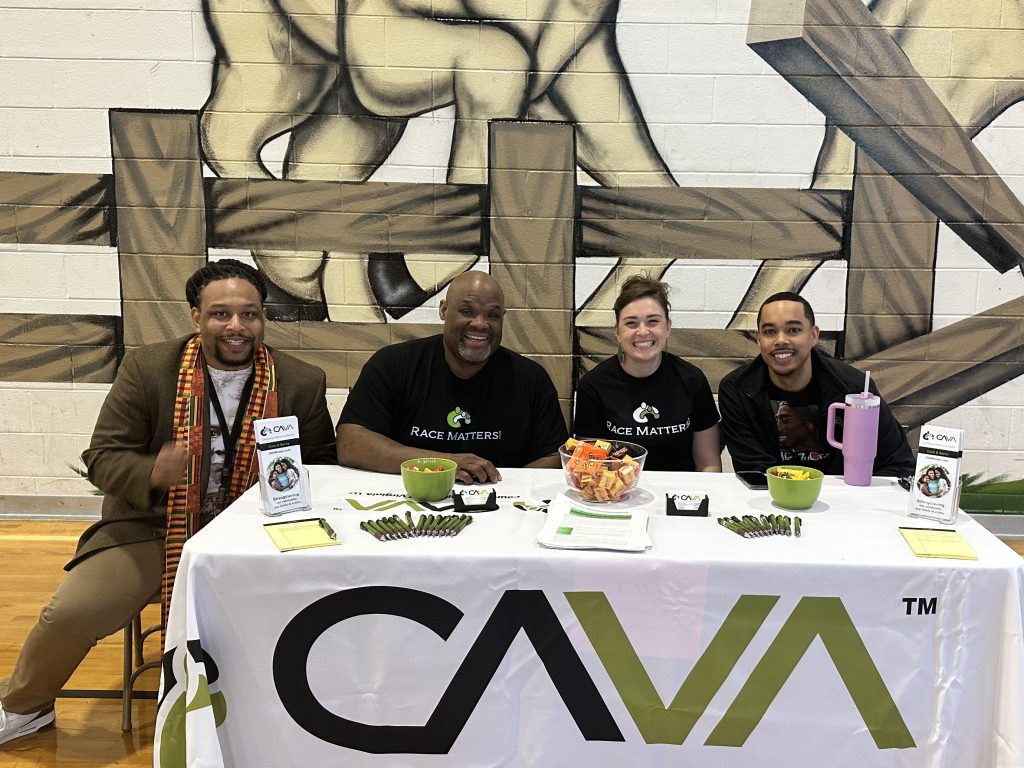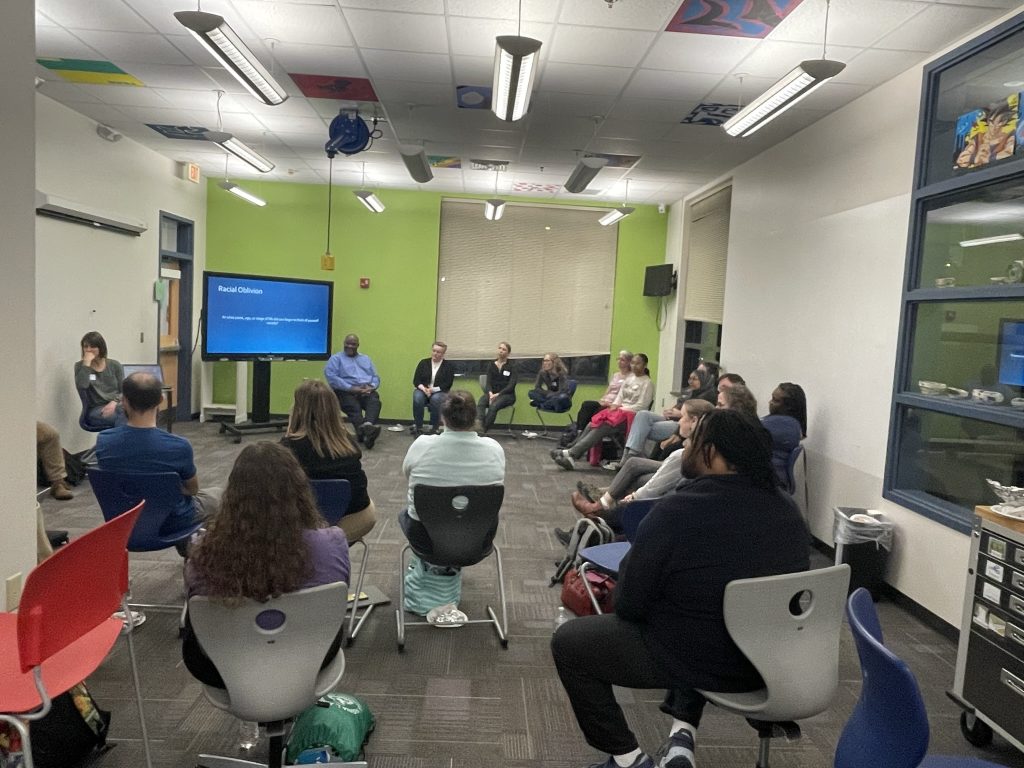
Making Connections through RACE Matters in Schools with Albemarle County Public Schools – 2025-2026
October 14, 2025 @ 5:30 pm - April 28, 2026 @ 7:30 pm
FreeAlbemarle County Public Schools
&
Counseling Alliance of Virginia
The organizations have partnered for the past 3 years to create space for stronger connections between students, parents, teachers, and school administrators. This partnership aims to improve their school system and support their initiative to be intentional in developing a community and organization that fosters an Anti-Racist and Inclusive environment.
Understanding the Impact of Race:
Despite the racial progress made in virtually all domains of society, race continues to be one of the most challenging and potentially polarizing issues of our time. Both the sensitivity and explosiveness associated with it breed caution and trepidation. Race permeates and powerfully affects all spheres of our interpersonal relationships. It is often a critical issue that provides an influential backdrop against which many professional relationships are transacted. Race, and our relationship with it, frequently compromises and complicates how we are and who we are in relationships.
Finding ways to negotiate the delicate dilemmas associated with race effectively is imperative. Regardless of the setting or circumstance, addressing intense racial interactions remains a monumental undertaking. Conversations involving race usually range from hyper guardedness and awkwardness to explosiveness, often ignoring the middle ground.
As a society, we seem to be entrapped in an inextricable racial quagmire. In our zest to put our turbulent and troubled past of racial injustice behind us, we often deny the significance of race. We work assiduously to avoid seeing, acknowledging, or naming race. The perpetual denial of the importance of race is problematic in many ways. It contributes to an ever-widening chasm between the racially privileged and the racially oppressed. As a result, the former consistently underestimates the significance of race while the latter tends to overestimate it. As such, the respective worlds of these two polarized groups travel a parallel course, only intersecting when they collide.
Common ground is often a desirable and laudatory goal, although a virtually impossible one to achieve because of strong conflicting views regarding the significance of race. The tension that exists as a result of these persistent and long-standing irreconcilable differences is often ameliorated by an unspoken agreement to “not talk about race,” especially in racially heterogeneous settings. Unfortunately, the workplace is usually no exception to this rule. Whether in or outside of the private or corporate sector, conducting progressive conversations about race and possessing the ability to address thorny racial issues effectively requires will and skill. Racial Sensitivity training is a crucial strategy for fostering a deeper understanding and acquiring the skills necessary to address race-related issues.
Call to Action:
Promoting awareness of and sensitivity to issues of race, equity, and inclusion (REI) is often enhanced by developing mastery in the three interrelated developmental areas of seeing, being, and doing. Evolving attention to the synergistic interplay of these three dynamics helps to promote a deeper and more comprehensive understanding of REI and the varied ways in which these issues inform and shape most interactions within organizations and institutions.
The process of the SEEING stage refers to developing a visual acuity to see the nuances and intricacies of race that are embedded in our historical roots as a nation, as well as contemporary societal norms, actions, beliefs, and interactions. he skill of seeing allows one to see the world through a prism of race while beginning to ask oneself: “How do I explicitly and tacitly contribute to what I am (now) seeing?” “What is my individual and collective relationship to what I am seeing?” and “How am I complicit with what I am seeing?” The culmination of the process of seeing lea ds one to begin to engage in acts of self-examination, self-reflection, and self-interrogation. When this occurs, the focus shifts to being part of the process.
ds one to begin to engage in acts of self-examination, self-reflection, and self-interrogation. When this occurs, the focus shifts to being part of the process.
The BEING stage refers to the inevitable phase of the developmental process where one forms a heightened sense of oneself as a racial being. This process is one of intense self-reflection, examination, and interrogation. It is during this phase that one engages in a critical self-critique of significant issues, such as one’s understanding of and exposure to racial equity and inclusion. This phase is also devoted to an exploration of how one has been racially socialized and an examination of internalized racial messages and implicit biases that one holds. The being phase paves the way for one to ask oneself: “Now that I see what I see and know what I know, what is my responsibility for action?” Other relevant questions include: “What action(s) am I willing to take on behalf of self and others?” and “What are the competencies and skills that I need to effectively carry out the plan of action I have assigned to myself?” These questions and self-reflections facilitate the transition to the final stage of developing awareness of sensitivity to issues of REI, which is doing.
The DOING stage of the process is devoted to assessing and promoting will and skill, the two crucial prerequisites to addressing REI issues. Will refers to having the intestinal fortitude as well as the resolve to make the emotional, psychological, and resource investments necessary to take definitive and decisive actions to address and alter issues pertinent to REI. Skill, on the other hand, refers to possessing the tools and the accompanying “know-how” necessary to effect change. Among the many tasks that are emblematic of possessing the required skill, demonstrating the ability to engage in substantive and progressive conversations about REI effectively is paramount.
Professional Development
Race Matters in Schools would allow Teachers and School Personnel Who Require a License to fulfill their educational renewal points for licensure. Attendees will need to attend all twelve sessions to obtain 24 Points. This will apply to Statutory, 5-Year, and 10-Year requirements.
Educational Project: An educational project is an option for the license holder to enhance the skills or advance the educational needs of the group being served. Activities within this option may include a broad range of programs: participation in a special project assigned by the division superintendent; participation in an alternative work-experience program (paid or volunteer) in which the license holder fulfills new professional responsibilities for a specified period of time; participation in a program of independent study, provided that the license holder investigates a specific aspect of education, produces a written report or other tangible product, and evaluates the independent study and its product. Additional activities within this option may include institutional self-study projects, administrative review projects, teaching of a course for a college/university or for an employing educational agency, and/or other activities for school improvement.
Domains of Professional Competency:
- Concepts and principles of physical, intellectual, psychological, social, and emotional development of children and youth;
- Concepts and principles of communication, learning, exceptionality, individuality, and cultural differences, such as oral and written communication, motivation, retention, and individual differences; and
- Concepts and principles of effective relationships among schools, families, and communities.
Cultural Competency (15 points)
Click the link for further details: Virginia Department of Education | Home
Who Should Attend:
Parents, Parent Teacher Organizations, Special Ed Teachers
Teachers, Teacher Assistants, Crossing Guards
Food Service Workers, School Resource Officers,
Administrative Staff, School Bus Drivers,
School Nurses, School Mental Health Counselors,
School Social Workers, SchoolCustodians,
Academic Advisers, Maintenance,
Grounds Keepers, Guidance Counselors,
Athletic Directors, Sports Coaches,
Vice Principals, Principals
Essential Takeaways:
The training will be built upon the three developmental principles of Seeing, Being, and
Doing that will be translated into the following three primary training objectives:
To enhance racial sensitivity and awareness between and among members of the leadership and staff
To provide a framework for conducting progressive and productive conversations about race, as well as other dimensions of diversity
To further enhance the delivery of racially informed, culturally competent services
The entire training will be both didactic and experiential.
Recommended readings will be made available to all participants upon completion of the training.
The sessions will provide hands-on coaching for participant-driven handling of sensitive and challenging race/equity/inclusion-related issues.
Albemarle High School – Charlottesville, Virginia
(former location Hollymead Elementary)
October 14th & 28th, November 11th, December 9th,
January 13th & 27th, February 10th & 24th,
March 10th & 24th, and April 14th & 28th.
5-5:30 – Refreshments
5:30-7:30 pm – Didactic and Experimental Instruction
Gene E. Cash Jr., a Licensed Clinical Social Worker in Virginia and Ohio, is a proud Alum of The Ohio State University, with a background in mental health since 1991, ranging from Acute Care Psychiatric and Chemical Dependency Inpatient Units, Residential Community Corrections, and in private practice for over 34 years. Gene is passionate about caring for youth and their families and raising the integrity of the field by training clinicians in family therapy and understanding the importance of Racial Awareness and Sensitivity as it relates to Racial Trauma. As the Owner of Counseling Alliance of VA, LLC in Richmond and Charlottesville, Gene is dedicated to dismantling white supremacist ideology and how it impacts one’s mental health, as well as caring and serving wherever he and his team go.
LaTasha Edwards, MS, QMHP-C, has a background in Community-Based Counseling and Education and currently serves on the Albemarle County Human Services Alternative Response Team (HART). She has a master’s degree in human services counseling, with a cognate in Marriage and Family, and is a Qualified Mental Health Professional. She believes CAVA’s intentionality and commitment to naming, addressing, and interrupting racism are invaluable to her. It has become a core value of the company and is interwoven throughout. Some of the key ways this is done are through extensive training through Race Matters Workshops, regular Racial Awareness & Sensitivity staff meetings, and facilitating and co-facilitating community support groups focused on having conversations about race. She continues to understand her own racial identity, being aware of and developing sensitivity to others on their journey, and creating “muscles” to have hard conversations with others about race.
RACE Matters In Schools Volunteer Coordinator
Emily Mathon
emilymathon@gmail.com
“As an ACPS parent and committed volunteer, Emily Mathon assists the Counseling Alliance of Virginia team with the Race Matters in Schools series through her behind-the-scenes organizing. Emily brings her years of experience in the field of education and non-profit work; she currently directs a summer camp in Vermont and engages locally during the school year. Her passion for racial awareness and responsibility got re-ignited when her family moved to Charlottesville just weeks before the racist attacks in the summer of 2017. Emily believes deeply in the possibility of public education and that individuals and communities must discuss race and racism directly in order to heal and build a world where everyone thrives.”






